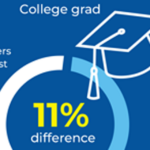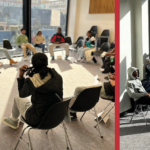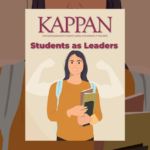It’s a moving, fascinating story that Nikole Hannah-Jones tells in the latest This American Life podcast, The Problem We All Live With, focusing on how the 2013 de-accreditation of the long-troubled Normandy (Missouri) schools (temporarily) sends roughly 1,000 mostly black kids to a mostly-white high school Francis Howell and in so doing creating a modern-day school integration experiment that has many of the challenges and opportunities that you might expect.
And it’s not just a wonky abstract policy story, either because Hannah-Jones tells it through the eyes of a Normandy mom and daughter who went through the process of becoming troubled by the Normandy schools and, desperate for a change, were willing to endure the 30-mile daily bus ride to a better opportunity. As several folks have already noted on Twitter, there’s some pretty amazing audio tape from St. Louis Public Radio from the community meeting when the white parents are first finding out that their schools are going to host an influx of Normandy kids.
It’s great that This American Life is returning to education so soon after last year’s two-part “Harper High.” Along with the Colbert Report (RIP), the Daily Show under Jon Stewart, and the PBS NewsHour, there are few other big-reach shows that return to education as frequently as This American Life.
And it’s fascinating that there’s so much new attention on the school integration issue lately after so many years of disinterest. Some of it’s coming from the media (including a new HBO series by David Simon later this month). Here are just a sampling of recent stories: New Tool Maps School Attendance Zones (EdWeek); Can Gentrification and School Integration Go Hand in Hand? (Atlantic); Does America Still Believe in Racial Integration? The Atlantic); Segregation and Its Impacts on Latino Education and Earnings (Washington Monthly); 50 Years After The Civil Rights Act, Integration Remains Elusive (Forbes).
Even elected officials are getting in on the act. There’s nothing that I’ve seen about it in any of the NCLB rewrite proposals being debated in conference, but Presidential candidate Hillary Clinton talked about it in South Carolina last week and I can’t imagine that Bernie Sanders hasn’t addressed it as well.
But still, I’ve got some questions. Does the show, which first aired on Friday and has been available online since last night, describe school integration as too much of a silver bullet? Is the comparison between integration and other school improvement efforts fair and complete? Does the narrative that integration is almost a taboo subject in education policy discussions ring true?
I guess that’s my main concern: that the show might underplay the challenges of integration in an effort to show how well it can work and urge greater attention to school inequalities, and in so doing set readers up for disappointment?
I don’t have any definitive answers yet — several of the experts I reached out to are on vacation or out of the country — but here are some observations and questions — most of which relate to the opening section in which host Ira Glass and reporter Hannah-Jones give an overview of the situation:
*School integration doesn’t always work, even when it’s attempted. Integrating buildings doesn’t always seem to work as well as expected, if it results in a two-tier system within a school with some kids taking advanced classes and others taking remedial ones. Integrated classrooms seem to work, but we can’t really say that integration works as a broader policy because it was done for so few schools for such a short time (right?).
*School integration efforts aren’t entirely dead. The St. Louis inter-district integration program was not “killed” in 1999, as reported on the show, notes Century Foundation education guru Rick Kahlenberg (who otherwise finds much to admire in the podcast). “It continues to exist to this day, with some 4,500 St. Louis students transferring to suburban schools.”
*The much-maligned 2002 NCLB federal education law included student transfer options for academic and safety reasons that were consistently blocked by “receiving” schools and districts. In a pretty amazing story from 2004, former Chicago Tribune reporter Stephanie Banchero wrote of one student whose mother attempted to make use of the school transfer option.
*Speaking of NCLB, it’s not that interventions and remediations tried under NCLB and other programs (literacy, magnet programs, early college, teacher quality, better leaders) literally “never” work, as host Glass describes in the opening, but rather that they don’t work dramatically or consistently or last over time. But couldn’t the same be said for integration?
*The political pressures against integration are enormous. The issue of white parents exiting school systems in response to integration– and pressuring elected officials to change direction — is described in the narrative of the story but not really addressed by Hannah-Jones and Glass as a policy consideration. We’re told that integration is the policy that nobody talks about anymore, and we learn about the (amazingly awful) things that scared white parents and district officials will do to limit the influx of black kids. But the political obstacles to integration — the reasons nobody talks about integration anymore — aren’t really addressed in the overview. Maybe that’s what gets detailed in the next segment. Meantime, check out this short documentary about the 1974 busing experiment in Boston.
Previous posts: School Segregation’s Back (In the News); What President Obama *Really* Said About Poverty at Georgetown; Atlantic Story Highlighting “Racial Gerrymandering” Named Magazine Award Finalist; Watch School Segregation Grow Over 20 Years; Rethinking The Neighborhood School Ideal; Decline In Black-White Segregation (Sorta); The (Partial) Re-Segregation Of American Schools.
ABOUT THE AUTHOR

Alexander Russo
Alexander Russo is founder and editor of The Grade, an award-winning effort to help improve media coverage of education issues. He’s also a Spencer Education Journalism Fellowship winner and a book author. You can reach him at @alexanderrusso.
Visit their website at: https://the-grade.org/










